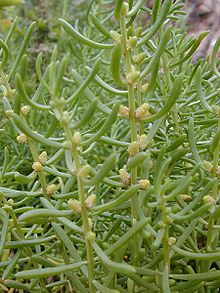Batis (plant)
| Batis | |
|---|---|
 |
|
| Male flowers on Batis maritima | |
| Scientific classification | |
| Kingdom: | Plantae |
| Clade: | Angiosperms |
| Clade: | Eudicots |
| Clade: | Rosids |
| Order: | Brassicales |
| Family: |
Bataceae Mart. ex Perleb |
| Genus: |
Batis L. |
| Species | |
|
|
Batis (turtleweed, saltwort, beachwort, or pickleweed) is a genus of two species of flowering plants, the only genus in the family Bataceae. They are halophytic (salt tolerant) plants, native to the coastal salt marshes of warm temperate and tropical America (B. maritima) and tropical Australasia (B. argillicola).
Both species are evergreen, low shrubs growing to 10–70 cm tall, prostrate where colonizing new mud, but once rooted, growing bushy. The leaves are small, swollen, fleshy, and narrowly club-shaped. They are bright green, but can also take on a reddish color. The flowers are small, produced in nonshowy spikes, flowering from midsummer to fall. The American species is dioecious, while the Australasian species is monoecious.
Some botanists divide B. maritima into five species, with B. californica, B. fruticosa, B. spinosa and B. vermiculatus split off, but this interpretation is not widely followed.
Batis has the ability to live in salty environments. When other plants are exposed to salty soil or water, they lose most of their stored water, but Batis has adapted to this environment and does not have these problems. To help it survive in this salty habitat, its fleshy leaves are covered with very fine hairs that reduce the amount of water the plant loses to the air.
An example habitat of occurrence of Batis maritima is in the Petenes mangroves ecoregion of the Yucatán.
Not many animals can eat it because it is too salty, but white-tailed deer eat B. maritima as part of their diets. Eastern pygmy-blue butterflies collect the nectar from its flowers. B. maritima is becoming rare in some areas, and some scientists think it should be added to the United States endangered species list, though it has also become an invasive species in Hawaii after accidental introduction there.
...
Wikipedia
